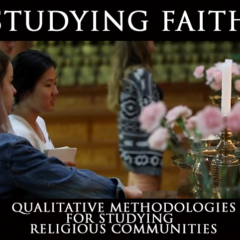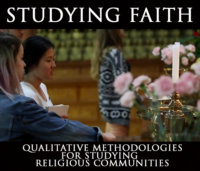It is certainly possible to study one’s own congregation, religious community or familiar spiritual practice, but there are a number of advantages and disadvantages to keep in mind when setting about such an investigation.
What is it like to study one’s own religious community?
Sociologist Sung Gun Kim discusses his experience studying Korean Christianity as a Christian himself in this video.
Advantages
The cultural intimacy that you share with a group may make it easier for you to establish trust with your research participants and the group. Since you are an insider, your research participants may feel less pressure to paint a favorable portrait of themselves or to project an overly positive image of the community. Additionally, you are also familiar with a number of aspects of the religious ritual, symbol and meaning that may not be noticed by people unfamiliar with the faith tradition.
Disadvantages
While familiarity can be an advantage, as an “insider” of a particular group, we sometimes tend to take some cultural features of our community for granted. We also can make assumptions about the meaning and significance of a particular phenomenon as shared by all members of the group. Because of this, it can be a challenge, or even an impossibility, to take on a position of being culturally neutral and to look at our own culture with a certain naiveté. This cultural intimacy can sometimes limit the kinds of observations and understandings we may make.
Click here to read about two students’ experience researching religion as insiders and outsiders
Nalika Gajaweera was a senior research analyst with the USC Center for Religion and Civic Culture through 2023.
Andrew Johnson is a contributing fellow with the USC Center for Religion and Civic Culture.

